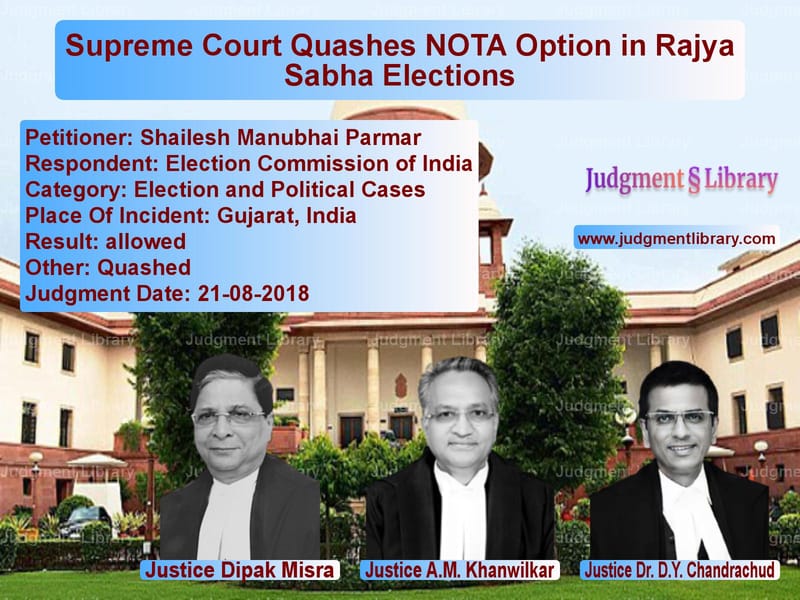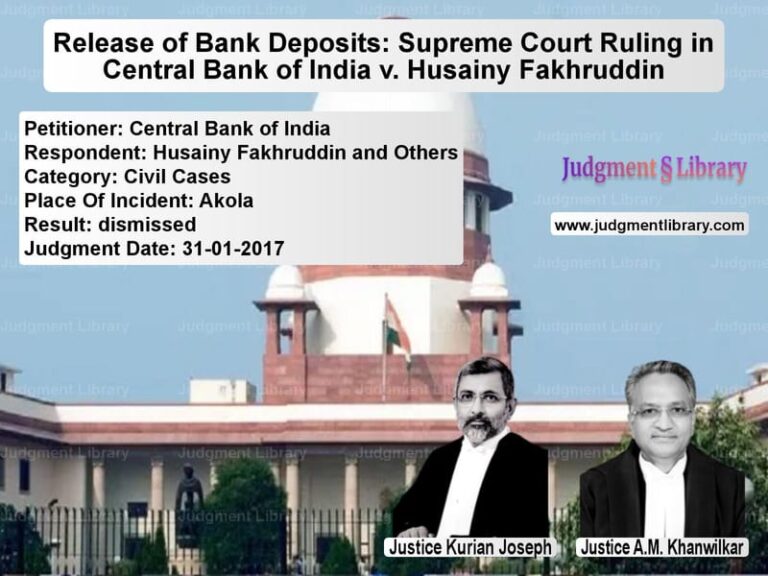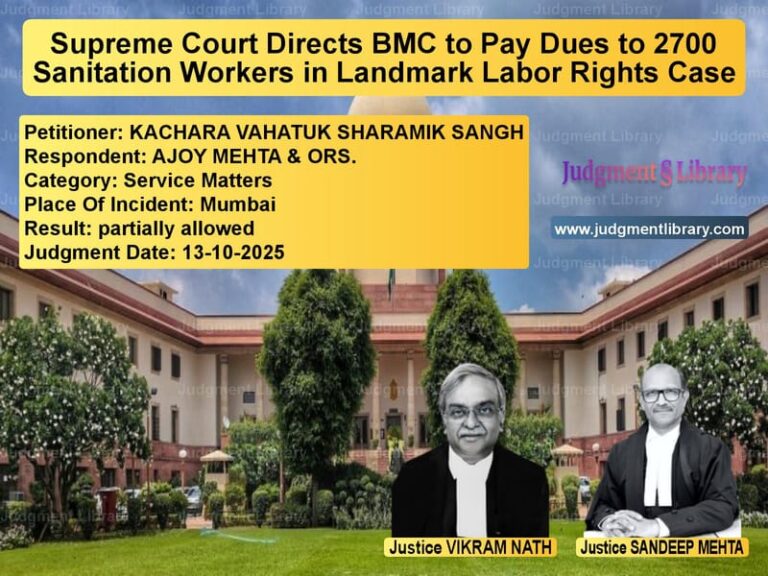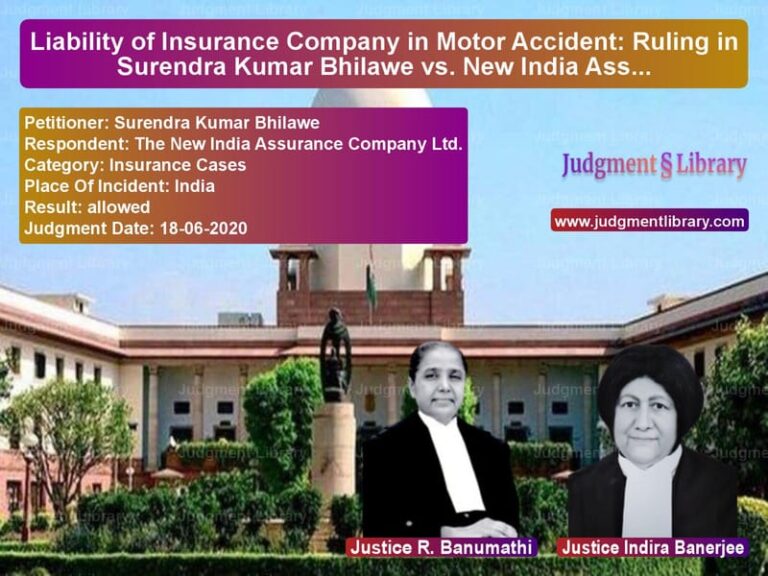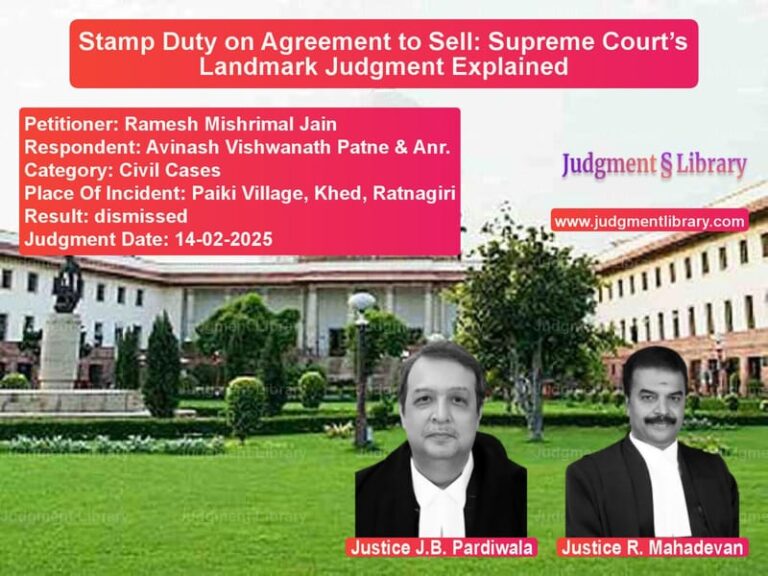Supreme Court Quashes NOTA Option in Rajya Sabha Elections
The Supreme Court of India, in its judgment dated August 21, 2018, addressed the constitutional validity of the ‘None of the Above’ (NOTA) option in Rajya Sabha elections. The case, Shailesh Manubhai Parmar vs. Election Commission of India, challenged the introduction of NOTA in the elections to the Council of States (Rajya Sabha). The petitioner, Shailesh Manubhai Parmar, a Chief Whip of the Indian National Congress in the Gujarat Legislative Assembly, argued that the use of NOTA in Rajya Sabha elections was unconstitutional and contrary to the principles of proportional representation and party discipline.
Background of the Case
The petitioner filed a writ petition under Article 32 of the Constitution of India, challenging the circular issued by the Election Commission of India (ECI) that allowed the NOTA option in Rajya Sabha elections. The petitioner argued that the introduction of NOTA was inconsistent with the scheme of indirect elections under Article 80(4) of the Constitution and violated the principles laid down in the Representation of the People Act, 1951.
Petitioner’s Arguments
The petitioner argued that:
- NOTA undermines the purpose of proportional representation by means of a single transferable vote as mandated by Article 80(4) of the Constitution.
- The introduction of NOTA in Rajya Sabha elections violates party discipline and opens the door for horse trading and corruption.
- The judgment in People’s Union for Civil Liberties (PUCL) vs. Union of India (2013) was intended only for direct elections and did not extend to indirect elections like Rajya Sabha.
- The ECI overstepped its authority by introducing NOTA without statutory backing.
Respondent’s Arguments
The Election Commission of India defended the introduction of NOTA, arguing that:
- The Supreme Court in PUCL case recognized the right of the voter not to vote, and this right extends to all elections, including Rajya Sabha.
- NOTA promotes free and fair elections and ensures that voters have the right to express their dissent.
- The introduction of NOTA was in line with the principles of democracy and transparency.
Supreme Court’s Observations
Chief Justice Dipak Misra, delivering the judgment, observed:
“The introduction of NOTA in indirect elections like Rajya Sabha undermines the concept of proportional representation and party discipline, which are integral to the Council of States.”
The Court noted that Rajya Sabha elections are distinct from direct elections to Lok Sabha or State Assemblies. In Rajya Sabha, elected members of the Legislative Assembly vote based on proportional representation by means of a single transferable vote. The concept of NOTA, the Court held, was not suitable for this system.
“The role of an elector in Rajya Sabha elections is bound by party discipline and proportional representation. Allowing NOTA would disrupt the electoral process and lead to potential misuse, including cross-voting and defections,” the Court stated.
Analysis of Proportional Representation
The Court emphasized the importance of proportional representation in Rajya Sabha elections:
“The value of a vote in Rajya Sabha elections is based on the principle of proportional representation. An elector’s vote has a specific value, and the system ensures that minority voices are represented. Introducing NOTA disturbs this balance and defeats the purpose of indirect elections.”
The Court highlighted that the PUCL judgment was limited to direct elections and the principle of secret ballot. In Rajya Sabha elections, open ballot is used to ensure transparency and accountability among party members. The introduction of NOTA, the Court noted, would contradict the very nature of this electoral process.
Final Verdict
The Supreme Court quashed the circulars issued by the Election Commission that allowed NOTA in Rajya Sabha elections. The judgment concluded:
- NOTA is not applicable in Rajya Sabha elections as it undermines the system of proportional representation and party discipline.
- The Election Commission’s decision to introduce NOTA in Rajya Sabha elections was beyond its constitutional and statutory powers.
- The Court directed the Election Commission to ensure that NOTA is not used in any future Rajya Sabha elections.
Conclusion
The Supreme Court’s judgment in Shailesh Manubhai Parmar vs. Election Commission of India clarifies that the concept of NOTA, while relevant for direct elections, is incompatible with the nature of Rajya Sabha elections. The ruling underscores the importance of proportional representation and party discipline in maintaining the integrity of indirect elections. By disallowing NOTA, the Court ensures that the Rajya Sabha election process remains faithful to its constitutional mandate and prevents potential misuse that could undermine the democratic process.
Petitioner Name: Shailesh Manubhai Parmar.Respondent Name: Election Commission of India.Judgment By: Justice Dipak Misra, Justice A.M. Khanwilkar, Justice Dr. D.Y. Chandrachud.Place Of Incident: Gujarat, India.Judgment Date: 21-08-2018.
Don’t miss out on the full details! Download the complete judgment in PDF format below and gain valuable insights instantly!
Download Judgment: Shailesh Manubhai Pa vs Election Commission Supreme Court of India Judgment Dated 21-08-2018.pdf
Direct Downlaod Judgment: Direct downlaod this Judgment
See all petitions in Constitution Interpretation
See all petitions in Legislative Powers
See all petitions in Separation of Powers
See all petitions in Judgment by Dipak Misra
See all petitions in Judgment by A M Khanwilkar
See all petitions in Judgment by Dhananjaya Y Chandrachud
See all petitions in allowed
See all petitions in Quashed
See all petitions in supreme court of India judgments August 2018
See all petitions in 2018 judgments
See all posts in Election and Political Cases Category
See all allowed petitions in Election and Political Cases Category
See all Dismissed petitions in Election and Political Cases Category
See all partially allowed petitions in Election and Political Cases Category

